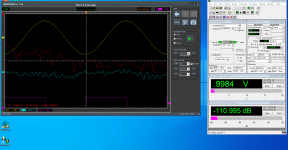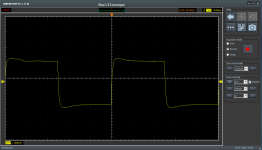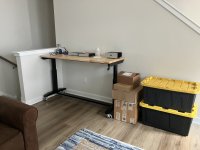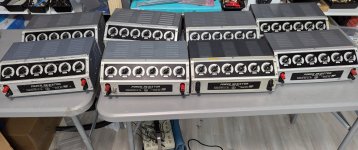I got the Hantech 8 ch scope. It does work butt the software is not that great. I have been spoiled by Picotech. Here is a screenshot of a wave, its distortion (from AP) and the distortion spectrum. The red trace is the spectrum. The square wave at the bottom is the sync from the AP. I'm not as thrilled as I hoped but 8 channels for $108 is very good. It is pretty flat to 100 KHz and almost makes it to 200 KHz but the levels are down and aliasing surfaces. There is a little peaking on squarewaves also shown. I'm torn about keeping it. Still 8 simultaneous waveforms. . .
Attachments
I would be happy to share the HV design. The PA85's are pricey but can be had from eBay for around $50. https://oshwlab.com/1audio/hv-amp
That's pretty standard looking software from a Hantech scope I had years ago. Not much changes!
I have an Agilent 54642D, then bought a Keysight MSOX3104T. I don't often need 8 channels, but these 8 channel scopes are being pushed. I have 16 digital channels and 4 analogue with the Keysight.
So Demian ... I have to ask, why didn't you get another Picoscope? Or, don't they offer a 8 channel? Can you couple a pair of 4 channel scopes?
Thanks for the design, nice to study. I don't have a call for that capability right now.
-Chris
I have an Agilent 54642D, then bought a Keysight MSOX3104T. I don't often need 8 channels, but these 8 channel scopes are being pushed. I have 16 digital channels and 4 analogue with the Keysight.
So Demian ... I have to ask, why didn't you get another Picoscope? Or, don't they offer a 8 channel? Can you couple a pair of 4 channel scopes?
Thanks for the design, nice to study. I don't have a call for that capability right now.
-Chris
Picoscope- starts at over $1300 for 4 channels. Hantek $110 for 8 channels. And the goal is as a waveform and spectrum monitor for the AP (or whichever audio analyzer is in use). It turns out the Picoscope would be fine and I have it. Still even a 2 ch Picoscope 3000 is over $500, and the entry level is $200+.
I found the Hantek almost useful. Then one channel died for no reason. I was not impressed. It wasn't even connected to a signal. I always used X10 probes with it, so I didn't cook the input network.
Yes, the Hantek is cheap and who knows how durable. I can still return it.
I got my Picoscope ADC 200-100 working on a Win 10 PC. Its a real challenge for a device thats designed around a parallel port. And working with an AP S1 with its PCMCIA card. I hate having useable stuff become landfill because of the march of technology. I still have an errant 10 KHz noise to chase down.
I got my Picoscope ADC 200-100 working on a Win 10 PC. Its a real challenge for a device thats designed around a parallel port. And working with an AP S1 with its PCMCIA card. I hate having useable stuff become landfill because of the march of technology. I still have an errant 10 KHz noise to chase down.
Demian, the words you speak are so true with regard to Windows.
It isn't the march of technology. In this case It is simply Microsoft messing things up. I have so many instruments and programmers I can't use on Windows anymore. That isn't the fault of the device, but rests squarely on Microsoft and their arrogance. Stuff that ran on Linux still runs happily on the latest release.
If I didn't need Windows to run a few things, I'd be using Fedora, simple as that. They don't have to change things because they got it right the first time. You never have to relearn the OS. Windows has become an industry onto itself, and the cost to the world is massive.
It isn't the march of technology. In this case It is simply Microsoft messing things up. I have so many instruments and programmers I can't use on Windows anymore. That isn't the fault of the device, but rests squarely on Microsoft and their arrogance. Stuff that ran on Linux still runs happily on the latest release.
If I didn't need Windows to run a few things, I'd be using Fedora, simple as that. They don't have to change things because they got it right the first time. You never have to relearn the OS. Windows has become an industry onto itself, and the cost to the world is massive.
Working on my ESI 2150 LCR bridge. Power supply quit. . The picture doesn't do justice to how much you need to dismantle to get at the supply:

More like late 1970's. The machine uses an S100 buss and Z80 processor. Fortunately I even managed to scrounge an S100 buss extender card. I was designing Computer insides back then. All too familiar.That really does bring back memories. Screams 1980's, doesn't it?
They have been building up for the last several years - I've been cherry picking the ones that were in very bad cosmetic condition and therefore relatively inexpensive. Lot of cleaning and repainting, some new hardware and then calibrating. I have the parts to three more but the faceplate is pretty much completely blank - one my fault, one someone painted but did not relabel and one that needs to be redone. I have a CAD file I made for the labels but haven't had them printed yet. As you know, I've been busy with the move as well as taking care of mom so I've really just now gotten to the point of starting working on everything. Of course, the fact that it's too damn hot outside to do much helps with more play time. I think next on the list will be the big stacks of HP 3455A's (9) and 3456A's (12) that have also built up. Then, of course, it's on to the rest.
Hal
Hal
Those would be big stacks Hal! I have a 3456A, standard lab meter size.
Keep cool and keep mom happy!
Keep cool and keep mom happy!
I have one.It has a mismatched knob. I have used it a few times. I can't see a use for 6. (I have similar problems, like 10 Tek scopes.) I have not looked inside for a loog time. Are the 2 sets of binding posts to provide kelvin sensing?
I got the errant power supply in the Videobridge working. One of the main filter caps "evaporated. The other cap- in series- was OK. Wierd waveform (below). The circuit uses two large caps in series across the line. In 120V the line drives a voltage doubler, in 240 the rectifier is a full wave bridge. Do not even attemt to service if you do not have instruments that can do this safely. The Tek THS720 has 2 isolated 100MHz inputs and was designed for servicing high voltage high power stuff. An isolation transformer is also important but not a guarantee of safe probing. I learned a lot about offline switching supplies. And would only bother to fix one if its not easily replacable (PC power).
I also replaced the existing fan with a smart temperature controlled DC fan. Lots quieter and more airflow.
I'm waiting for some more caps before I start the assembly puzzle. . .

I also replaced the existing fan with a smart temperature controlled DC fan. Lots quieter and more airflow.
I'm waiting for some more caps before I start the assembly puzzle. . .
I have one.It has a mismatched knob. I have used it a few times. I can't see a use for 6. (I have similar problems, like 10 Tek scopes.) I have not looked inside for a loog time. Are the 2 sets of binding posts to provide kelvin sensing?
Antique Radio Supply sells the crowsbeak knobs if you would like a matched set. I really don't need even 1 - I enjoy restoring them and then selling them. And the binding posts are in parallel - the top two are connected as are the bottom two, one set feeds from the left and the other from the right. No Kelvin sensing as these are designed to be fairly accurate but not precise - they are meant for high power dispersion (225W per decade) over a large resistance range. They were first introduced in 1945:
I love these Frankenstein lab devices...
Here's an interesting tidbit -- the laboratory stuff in the movie "Young Frankenstein" were borrowed from the original 1931 Boris Karlof film.
==Do not even attemt to service if you do not have instruments that can do this safely.
wiser words were never typed!
- Home
- Design & Build
- Equipment & Tools
- What's on your workbench???



